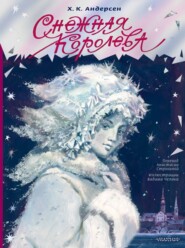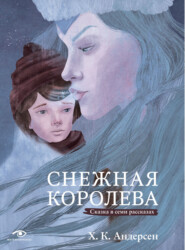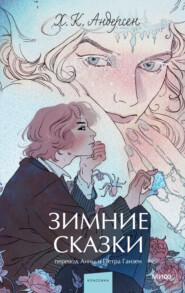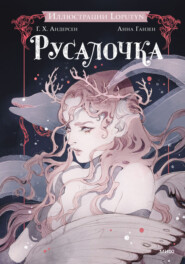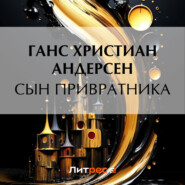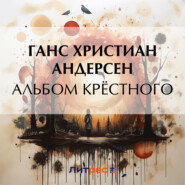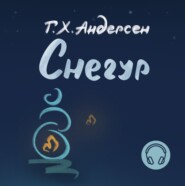По всем вопросам обращайтесь на: info@litportal.ru
(©) 2003-2024.
✖
The Sand-Hills of Jutland
Настройки чтения
Размер шрифта
Высота строк
Поля
The frog beckoned to him, and led him, behind tapestry that concealed him, through private passages out to the stables, and pointed to a horse. He sprang on it, and she also jumped up; and, placing herself before him, she held by the animal's mane. The prisoner understood her movement; and at full gallop they rode, by a path he never could have found, away to the open heath.
He forgot her ugly form – he knew that the grace and mercy of God could be evinced even by means of hobgoblins – he put up earnest prayers, and sang holy hymns. She trembled. Was it the power of the prayers and hymns that affected her thus? or was it a cold shivering at the approach of morning, that was about to dawn? What was it that she felt? She raised herself up into the air, attempted to stop the horse, and was on the point of leaping down; but the Christian priest held her fast with all his might, and chanted a psalm, which he thought would have sufficient strength to overcome the influence of the witchcraft under which she was kept in the hideous disguise of a frog. And the horse dashed more wildly forward, the heavens became red, the first ray of the sun burst forth through the morning sky, and with that clear gush of light came the miraculous change – she was the young beauty, with the cruel, demoniacal spirit. The astonished priest held the loveliest maiden in his arms he had ever beheld; but he was horror-struck, and, springing from the horse, he stopped it, expecting to see it also the victim of some fearful sorcery. Young Helga sprang at the same moment to the ground, her short childlike dress reaching no lower than her knees. Suddenly she drew her sharp knife from her belt, and rushed furiously upon him.
"Let me but reach thee – let me but reach thee, and my knife shall find its way to thy heart. Thou art pale in thy terror, beardless slave!"
She closed with him; a severe struggle ensued, but it seemed as if some invincible power bestowed strength upon the Christian priest. He held her fast; and the old oak tree close by came to his assistance by binding down her feet with its roots, which were half loosened from the earth, her feet having slid under them. There was a fountain near, and he splashed the clear, fresh water over her face and neck, commanding the unclean spirit to pass out of her, and signed her according to the Christian rites; but the baptismal water had no power where the fountain of belief had not streamed upon the heart.
Yet still he was the victor. Yes, more than human strength could have accomplished against the powers of evil lay in his acts, which, as it were, overpowered her. She suffered her arms to sink, and gazed with wondering looks and blanched cheeks upon the man whom she deemed some mighty wizard, strong in sorcery and the black art. These were mystic Rhunes he had recited, and magic characters he had traced in the air. Not for the glancing axe or the well-sharpened knife, if he had brandished these before her eyes, would they have blinked, or would she have winced; but she winced now when he made the sign of the cross upon her brow and bosom, and she stood now like a tame bird, her head bowed down upon her breast.
Then he spoke kindly to her of the work of mercy she had performed towards him that night, when, in the ugly disguise of a frog, she had come to him, had loosened his bonds, and brought him forth to light and life. She also was bound – bound even with stronger fetters than he had been, he said; but she also should be set free, and like him attain to light and life. He would take her to Hedeby, to the holy Ansgarius. There, in the Christian city, the witchcraft in which she was held would be exorcised; but not before him must she sit on horseback, even if she wished it herself – he dared not place her there.
"Thou must sit behind me on the horse, not before me. Thine enchanting beauty has a magic power bestowed by the evil one. I fear it; and yet the victory shall be mine through Christ."
He knelt down and prayed fervently. It seemed as if the surrounding wood had been consecrated into a holy temple; the birds began to sing, as if they belonged to the new congregation; the wild thyme sent forth its fragrant scent, as if to take the place of incense; while the priest proclaimed these Bible words: "To give light to them that sit in darkness, and in the shadow of death; to guide our feet into the way of peace."
And he spoke of everlasting life; and as he discoursed, the horse which had carried them in their wild flight stood still, and pulled at the large bramble berries, so that the ripest ones fell on little Helga's hand, inviting her to pluck them for herself.
She allowed herself patiently to be lifted upon the horse, and she sat on its back like a somnambulist, who was neither in a waking nor a sleeping state. The Christian priest tied two small green branches together in the form of a cross, which he held high aloft; and thus they rode through the forest, which became thicker and thicker, and the path, if path it could be called, taking them farther into it. The blackthorn stood as if to bar their way, and they had to ride round outside of it; the trickling streams swelled no longer into mere rivulets, but into stagnant pools, and they had to ride round them; but as the soft wind that played among the foliage of the trees was refreshing and strengthening to the travellers, so the mild words that were spoken in Christian charity and truth served to lead the benighted one to light and life.
It is said that a constant dripping of water will make a hollow in the hardest stone, and that the waves of the sea will in time round the edges of the sharpest rocks. The dew of grace which fell for little Helga softened the hard, and smoothed the sharp, in her nature. True, it was not discernible yet in her, nor was she aware of it herself. What knows the seed in the ground of the effect which the refreshing dew and the warm sunbeams are to have in producing from it vegetation and flowers?
As a mother's song to her child, unmarked, makes an impression upon its infant mind, and it prattles after her several of the words without understanding them, but in time these words arrange themselves into order, and they become clearer, so in the case of Helga worked that word which is mighty to save.
They rode out of the forest, and crossed an open heath; then again they entered a pathless wood, where, towards evening, they encountered a band of robbers.
"Whence didst thou steal that beautiful wench?" they shouted, as they stopped the horse, and dragged its two riders down; for they were strong and robust men. The priest had no other weapon than the knife which he had taken from little Helga. With that he now stood on his defence. One of the robbers swung his ponderous axe, but the young Christian fortunately sprang aside in time to avoid the blow, which then fell upon the unfortunate horse, and the sharp edge entered into its neck; blood streamed from the wound, and the poor animal fell to the ground. Helga, who had only at that moment awoke from her long deep trance, sprang forward, and cast herself over the gasping creature. The Christian priest placed himself before her as a shield and protection from the lawless men; but one of them struck him on the forehead with an iron hammer, so that it was dashed in, and the blood and brains gushed forth, while he fell down dead on the spot.
The robbers seized Helga by her white arms; but at that moment the sun went down, its last beam faded away, and she was transformed into a hideous-looking frog. The pale green mouth stretched itself over half the face, its arms became thin and slimy, and a broad hand, with webbed-like membranes, extended itself like a fan. Then the robbers withdrew their hold of her in terror and astonishment. She stood like the ugly animal among them, and, according to the nature of a frog, she began to hop about, and, jumping faster than usual, she soon escaped into the depths of the thicket. The robbers were then convinced that it was some evil artifice of the mischief loving Loke, or else some secret magical deception; and in dismay they fled from the place.
The full moon had risen, and its silver light penetrated even the gloomy recesses of the forest, when from among the low thick brushwood, in the frog's hideous form, crept the young Helga. She stopped when she reached the bodies of the Christian priest and the slaughtered horse: she gazed on them with eyes that seemed full of tears, and the frog uttered a sound that somewhat resembled the sob of a child who was on the point of crying. She threw herself first over the one, then over the other; then took water up in her webbed hand, and poured it over them; but all was in vain – they were dead, and dead they would remain. She knew that. Wild beasts would soon come and devour their bodies. No, that must not be; therefore she determined to dig a grave in the ground for them, but she had nothing to dig it with except the branch of a tree and both her own hands. With these she worked away until her fingers bled. She found she made so little progress, that she feared the work would never be completed. Then she took water, and washed the dead man's face; covered it with fresh green leaves; brought large boughs of the trees, and laid them over him; sprinkled dead leaves amongst the branches; fetched the largest stones she could carry, and placed them over the bodies, and filled up the openings with moss. When she had done all this she thought that their tomb might be strong and safe; but during her long and arduous labour the night had passed away. The sun arose, and young Helga stood again in all her beauty, with bloody hands, and, for the first time, with tears on her blooming cheeks.
During this change it seemed as if two natures were wrestling within her; she trembled, looked around her as if awakening from a painful dream, then seized upon the slender branch of a tree near, and held fast by it as if for support; and in another moment she climbed like a cat up to the top of the tree, and placed herself firmly there. For a whole long day she sat there like a frightened squirrel in the deep loneliness of the forest, where all is still and dead, people say. Dead! There flew by butterflies chasing each other either in sport or in strife. There were ant-hills near, each covered with hundreds of little busy labourers, passing in swarms to and fro. In the air danced innumerable gnats; crowds of buzzing flies swept past; lady-birds, dragon-flies, and other winged insects floated hither and thither; earth-worms crept forth from the damp ground; moles crawled about; otherwise it was still —dead, as people say and think.
None remarked Helga, except the jays that flew screeching to the top of the tree where she sat; they hopped on the branches around her with impudent curiosity, but there was something in the glance of her eye that speedily drove them away; they were none the wiser about her, nor, indeed, was she about herself. When the evening approached, and the sun began to sink, the transformation time rendered a change of position necessary. She slipped down from the tree, and, as the last ray of the sun faded away, she was again the shrivelled frog, with the webbed-fingered hands; but her eyes beamed now with a charming expression, which they had not worn in the beautiful form; they were the mildest, sweetest girlish eyes that glanced from behind the mask of a frog – they bore witness to the deeply-thinking human mind, the deeply-feeling human heart; and these lovely eyes burst into tears – tears of unfeigned sorrow.
Close to the lately raised grave lay the cross of green boughs that had been tied together – the last work of him who was now dead and gone. Helga took it up, and the thought presented itself to her that it would be well to place it amidst the stones, above him and the slaughtered horse. With the sad remembrances thus awakened, her tears flowed faster; and in the fulness of her heart she scratched the same sign in the earth round the grave – it would be a fence that would decorate it so well. And just as she was forming, with both of her hands, the figure of the cross, her magic disguise fell off like a torn glove; and when she had washed herself in the clear water of the fountain near, and in amazement looked at her delicate white hands, she made the sign of the cross between herself and the dead priest; then her lips moved, then her tongue was loosened; and that name which so often, during the ride through the forest, she had heard spoken and chanted, became audible from her mouth – she exclaimed, "Jesus Christ!"
When the frog's skin had fallen off she was again the beautiful maiden; but her head drooped heavily, her limbs seemed to need repose – she slept.
Her sleep was only a short one, however; she awoke about midnight, and before her stood the dead horse full of life; its eyes glittered, and light seemed to proceed from the wound in its neck. Close to it the dead Christian priest showed himself – "more beautiful than Baldur," the Viking's wife would have said; and yet he came as a flash of fire.
There was an earnestness in his large, mild eyes, a searching, penetrating look – grave, almost stern – that thrilled the young proselyte to the utmost depths of her heart. Helga trembled before him; and her memory awoke as if with the power it would exercise on the great day of doom. All the kindness that had been bestowed on her, every affectionate word that had been said to her, came back to her mind with an impression deeper than they had ever before made. She understood that it was love that, during the days of trial here, had supported her – those days of trial in which the offspring of a being with a soul, and a form of mud, had writhed and struggled. She understood that she had only followed the promptings of her own disposition, and done nothing to help herself. All had been bestowed on her – all had been ordained for her. She bowed herself in lowly humility and shame before Him who must be able to read every thought of the heart; and at that moment she felt as if a purifying flame darted through her – a light from the Holy Spirit.
"Daughter of the dust!" said the Christian priest, "from dust, from earth hast thou arisen – from earth shalt thou again arise! A ray from God's invisible sun shall stream on thee. No soul shall be lost. But far off is the time when life takes flight into eternity. I come from the land of the dead. Thou also shalt once pass through the dark valley into yon lofty realms of brightness, where grace and perfection dwell. I shall not guide thee now to Hedeby for Christian baptism. First must thou disperse the slimy surface over the deep morass, draw up the living root of thy life and thy cradle, and perform thy appointed task, ere thou darest to seek the holy rite."
And he lifted her up on the horse, and gave her a golden censer like those she had formerly seen at the Viking's castle; and strong was the perfume which issued from it. The open wound on the forehead of the murdered man shone like a diadem of brilliants. He took the cross from the grave, and raised it high above him; then away they went through the air, away over the rustling woods, away over the mountains where the giant heroes are buried, sitting on the slaughtered steed. Still onward the phantom forms pursued their way; and in the clear moonlight glittered the gold circlet round their brows, and the mantle fluttered in the breeze. The magic dragon, who was watching over his treasures, raised his head and gazed at them. The hill dwarfs peeped out from their mountain recesses and plough-furrows. There were swarms of them, with red, blue, and green lights, that looked like the numerous sparks in the ashes of newly-burned paper.
Away over forest and heath, over limpid streams and stagnant pools, they hastened towards "the wild morass," and over it they flew in wide circles. The Christian priest held aloft the cross, which looked as dazzling as burnished gold, and as he did so he chanted the mass hymns. Little Helga sang with him as a child follows its mother's song. She swung the censer about as if before the altar, and there came a perfume so strong, so powerful in its effect, that it caused the reeds and sedges to blossom; every sprout shot up from the deep bottom – everything that had life raised itself up; and with the rest arose a mass of water-lilies, which looked like a carpet of embroidered flowers. Upon it lay a sleeping female, young and beautiful. Helga thought she beheld herself mirrored in the calm water; but it was her mother whom she saw – the mud-king's wife – the princess from the banks of the Nile.
The dead Christian priest prayed that the sleeper might be lifted upon the horse. At first the latter sank under the additional burden, as if its body were but a winding-sheet fluttering in the wind; but the sign of the cross gave strength to the airy phantom, and all three rode on it to the solid ground.
Then crowed the cock at the Viking's castle, and the apparitions seemed to disappear in a mist, which was wafted away by the wind; but the mother and daughter stood together.
"Is that myself I behold in the deep water?" exclaimed the mother.
"Is that myself I see on the shining surface?" said the daughter.
And they approached each other till form met form in a warm embrace, and wildly the mother's heart beat when she perceived the truth.
"My child! my heart's own flower! my lotus from the watery deep!"
And she encircled her daughter with her arm, and wept Her tears caused a new sensation to Helga – they were the baptism of love for her.
"I came hither in the magic disguise of a swan, and I threw it off," said the mother. "I sank through the swaying mire deep into the mud of the morass, which like a wall closed around me; but soon I perceived that I was in a fresher stream – some power drew me deeper and still deeper down. I felt my eyelids heavy with sleep – I slumbered and I dreamed. I thought that I was again in the interior of the Egyptian pyramid, but before me still stood the heaving alder trunk that had so terrified me on the surface of the morass. I saw the cracks in the bark, and they changed their appearance, and became hieroglyphics. It was the mummy's coffin I was looking at; it burst open, and out issued from it the monarch of a thousand years ago – the mummy form, black as pitch, dark and shining as a wood-snail, or as that thick slimy mud. It was the mud-king, or the mummy of the pyramids; I knew not which. He threw his arms around me, and I felt as if I were dying. I only felt that I was alive again when I found something warm on my breast, and there a little bird was flapping with its wings, twittering and singing. It flew from my breast high up in the dark, heavy space; but a long green string bound it still to me. I heard and I comprehended its tones and its longing: "Freedom! Sunshine! To the father!" Then I thought of my father in my distant home, that dear sunny land – my life, my affection – and I loosened the cord, and let it flutter away home to my father. Since that hour I have not dreamed. I have slept a long, dark, heavy sleep until now, when the strange sounds and perfume awoke me and set me free."
That green tie between the mother's heart and the bird's wings, where now did it flutter? what now had become of it? The stork alone had seen it. The cord was the green stem; the knot was the shining flower – the cradle for that child who now had grown up in beauty, and again rested near her mother's heart.
And as they stood there embracing each other the stork-father flew in circles round them, hastened back to his nest, took from it the magic feather disguises that had been hidden away for so many years, cast one down before each of them, and then joined them as they raised themselves from the ground like two white swans.
"Let us now have some chat," said the stork-father, "now we understand each other's language, even though one bird's beak is not exactly made after the pattern of another's. It is most fortunate that you came to night; to-morrow we should all have been away – the mother, the young ones, and myself. We are off to the south. Look at me! I am an old friend from the country where the Nile flows, and so is the mother, though there is more kindness in her heart than in her tongue. She always believed that the princess would make her escape. The young ones and I brought these swan garbs up here. Well, how glad I am, and how fortunate it is that I am here still! At dawn of day we shall take our departure – a large party of storks. We shall fly foremost, and if you will follow us you will not miss the way. The young ones and myself will have an eye to you."
"And the lotus flower I was to have brought," said the Egyptian princess; "it shall go within the swan disguise, by my side, and I shall have my heart's darling with me. Then homewards – homewards!"
Then Helga said that she could not leave the Danish land until she had once more seen her foster-mother, the Viking's excellent wife. To Helga's thoughts arose every pleasing recollection, every kind word, even every tear her adopted mother had shed on her account; and, at that moment, she felt that she almost loved that mother best.
"Yes, we must go to the Viking's castle," said the stork; "there my young ones and their mother await me. How they will stare! The mother does not speak much; but, though she is rather abrupt, she means well. I will presently make a little noise, that she may know we are coming."
And he clattered with his bill as he and the swans flew close to the Viking's castle.
Within it all were lying in deep sleep. The Viking's wife had retired late to rest; she lay in anxious thought about little Helga, who now for full three days and nights had disappeared along with the Christian priest: she had probably assisted him in his escape, for it was her horse that was missing from the stables. By what power had all this been accomplished? The Viking's wife thought upon the wondrous works she had heard had been performed by the immaculate Christ, and by those who believed on him and followed him. Her changing thoughts assumed the shapes of life in her dreams; she fancied she was still awake, lost in deep reflection; she imagined that a storm arose – that she heard the sea roaring in the east and in the west, the waves dashing from the Kattegat and the North Sea; the hideous serpents which encircled the earth in the depths of the ocean struggling in deadly combat. It was the night of the gods – Ragnarok, as the heathens called the last hour, when all should be changed, even the high gods themselves. The reverberating horn sounded, and forth over the rainbow[3 - The Bridge of Heaven in the fables of the Scandinavian mythology. —Trans.] rode the gods, clad in steel, to fight the final battle; before them flew the winged Valkyries, and the rear was brought up by the shades of the dead giant-warriors; the whole atmosphere was illuminated around them by the Northern lights, but darkness conquered all – it was an awful hour!
And near the terrified Viking's wife sat upon the floor little Helga in the ugly disguise of the frog; and she shivered and worked her way up to her foster-mother, who took her in her lap, and disgusting as she was in that form, lovingly caressed her. The air was filled with the sounds of the clashing of swords, the blows of clubs, the whizzing of arrows, like a violent hail-storm. The time was come when heaven and earth should be destroyed, the stars should fall, and all be swallowed up below in Surtur's fire; but a new earth and a new heaven she knew were to come; the corn was to wave where the sea now rolled over the golden sands; the unknown God at length reigned; and to him ascended Baldur, the mild, the lovable, released from the kingdom of death. He came; the Viking's wife beheld him – she recognised his countenance: it was that of the captive Christian priest. "Immaculate Christ!" she cried aloud; and whilst uttering this holy name she impressed a kiss upon the ugly brow of the frog-child. Then fell the magic disguise, and Helga stood before her in all her radiant beauty, gentle as she had never looked before, and with speaking eyes. She kissed her foster-mother's hands, blessed her for all the care and kindness which she, in the days of distress and trial, had lavished upon her; thanked her for the thoughts with which she had inspired her mind – thanked her for mentioning that name which she now repeated, "Immaculate Christ!" and then lifting herself up in the suddenly adopted shape of a graceful swan, little Helga spread her wings widely out with the rustling sound of a flock of birds of passage on the wing, and in another moment she was gone.
The Viking's wife awoke, and on the outside of her casement were to be heard the same rustling and flapping of wings. It was the time, she knew, when the storks generally took their departure; it was them she heard. She wished to see them once more before their journey to the south, and bid them farewell. She got up, went out on the balcony, and then she saw, on the roof of an adjoining outhouse, stork upon stork, while all around the place, above the highest trees, flew crowds of them, wheeling in large circles; but below, on the brink of the well, where little Helga had but so lately often sat, and frightened her with her wild actions, sat now two swans, looking up at her with expressive eyes; and she remembered her dream, which seemed to her almost a reality. She thought of Helga in the appearance of a swan; she thought of the Christian priest, and felt a strange gladness in her heart.
The swans fluttered their wings and bowed their necks, as if they were saluting her; and the Viking's wife opened her arms, as if she understood them, and smiled amidst her tears and manifold thoughts.
Then, with a clattering of bills and a noise of wings, the storks all turned towards the south to commence their long journey.
"We will not wait any longer for the swans," said the stork-mother. "If they choose to go with us, they must come at once; we cannot be lingering here till the plovers begin their flight. It is pleasant to travel as we do in a family party, not like the chaffinches and strutting cocks. Among their species the males fly by themselves, and the females by themselves: that, to say the least of it, is not at all seemly. What a miserable sound the stroke of the swans' wings has compared with ours!"
"Every one flies in his own way," said the stork-father. "Swans fly slantingly, cranes in triangles, and plovers in serpentine windings."
"Name not serpents or snakes when we are about to fly up yonder," said the stork-mother. "It will only make the young ones long for a sort of food which they can't get just now."
"Are these the high hills, beneath yonder, of which I have heard?" asked Helga, in the disguise of a swan.
"These are thunder-clouds driving under us," replied her mother.






